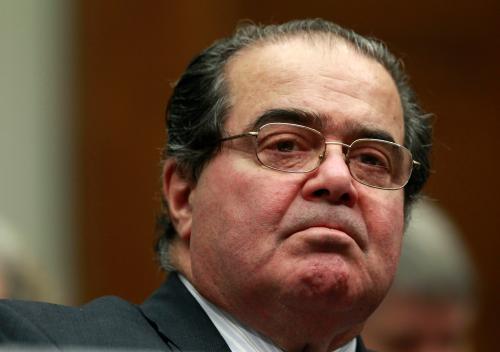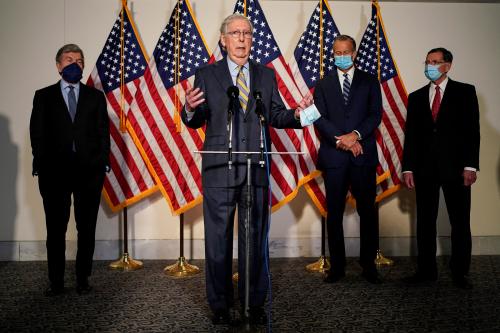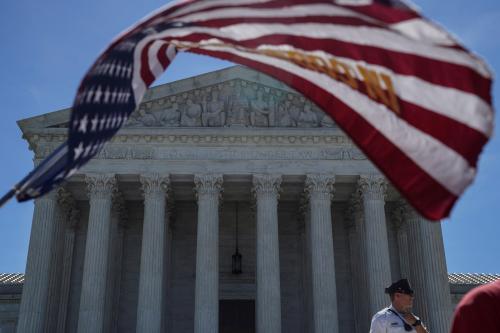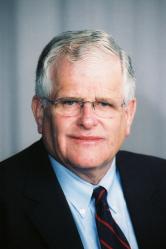The president’s choice to fill the vacancy created by the February 13 death of Justice Antonin Scalia injects into the already-noxious replacement battle a highly respected, experienced judge who has won high bi-partisan praise in earlier years.
The Senate majority, though, is sticking with Senator Mitch McConnell’s insistence hours after Justice Scalia’s death that the “American people should have a voice in the selection of their next Supreme Court Justice. Therefore, this vacancy should not be filled until we have a new President.” Senate Republicans may regret this decision if a President Hillary Clinton, with a Democratic Senate, nominates less centric candidates than Judge Garland, or if Senate Democrats wage all-out war against a nominee of a President Cruz or Trump to fill the vacancy they would not let President Obama fill. And do they really want to make the Supreme Court a football in the presidential election?
Elections and the make-up of the federal judiciary
That elections should influence the composition of the federal judiciary is not a novel idea. Less clear is when sitting presidents should cede to unknown successors the right to have nominations considered.
In a famous 1957 law review article, Yale political scientist Robert Dahl argued that the life-tenured, non-elected Supreme Court is a “national policy maker” but one that our democracy keeps in check through periodic elections of those who nominate and confirm judges. Chief Justice William Rehnquist said the same thing in a 1996 law school lecture, where he bucked election-year calls to impeach a district judge for his over-the-top criticisms of the police. Presidential and senatorial elections—and subsequent nominations and confirmations—he said, provide “indirect popular input into the selection of federal judges.” That elections have sometimes changed the direction of the Court “simply shows,” he added, “that there is a wrong way and a right way to go about putting a popular imprint on the federal judiciary.” Candidates’ nomination priorities are rarely a key part of their campaigns but are reflected in the constellation of values they present to voters.
But acknowledging that presidential and senatorial elections are a proper, if diffuse, means of shaping and reshaping the judiciary says little about how to cabin presidents’ and senators’ right to try to do so.
Few would argue that post-election lame duck presidents should try to get judges confirmed (even though Jimmy Carter, after his 1980 defeat, nominated Stephen Breyer to the court of appeals, whom the lame duck Senate confirmed 80-10. Similarly unusual was Dwight Eisenhower’s uncontested recess appointment of Justice William Brennan on the eve of the 1956 presidential election.)
In 1992, Senate Judiciary Committee chair Joseph Biden said a president should not try to fill a Supreme Court vacancy occurring in July or later of an election year. Senator McConnell moved that threshold at least to mid-February; had Justice Scalia died in late or even mid- 2015, Senate objectors likely would have cited the already-underway election contests as reason to defer consideration of any nomination to 2017.
Unintended consequences?
Republicans’ insistence, for whatever reason, on waiting until 2017 may have unintended consequences, given the growing likelihood, if not inevitability, of a Clinton-Trump presidential contest.
On the one hand, should Clinton win—and bring a Democratic Senate with her—and face the prospect of filling not only the Scalia vacancy but others that could well arise, Republicans may rue having spurned the chance to confirm a well-regarded moderate jurist. One already hears speculation of a lame-duck Garland confirmation after the November elections.
On the other hand any Cruz or Trump victory would likely result from a very tight and very nasty election. If either of them then tries to put a conservative judge into the seat that Republicans refused to let Obama fill, Senate Democrats are not going to let bygones be bygones. The confirmation battles will be ferocious, further degrading the once benign process of staffing the judiciary.
And McConnell’s insistence that the “American people should have a voice in the selection of their next Supreme Court Justice” runs smack into Chief Justice Roberts’s plea to tone down the partisan rhetoric about the Court. “We don’t work as Democrats or Republicans,” he said in a recent law school appearance. Who will believe that if the current standoff transforms future Supreme Court nominations from what they have traditionally been—a background issue about possible vacancies—to front-and-center on the campaign trail?
The Brookings Institution is committed to quality, independence, and impact.
We are supported by a diverse array of funders. In line with our values and policies, each Brookings publication represents the sole views of its author(s).











Commentary
Why Republicans may regret spurning the opportunity to confirm Judge Merrick Garland
March 17, 2016